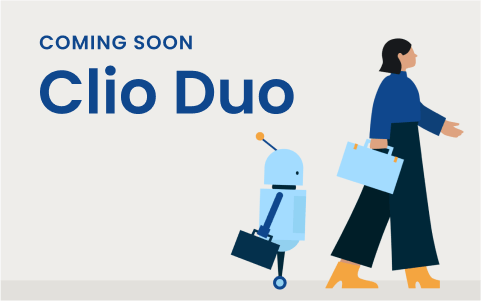Being a lawyer isn’t easy. From intaking new clients to juggling open legal cases and keeping up with administrative work, being a great lawyer requires careful management, patience, and dedication. The great news is: Chatbots for lawyers can help with all aspects of a lawyer’s day-to-day.
Typically, chatbots are best known as a precursor to a legal professional. A chatbot presents a client with a few questions so the chatbot can direct them to the right person. However, there’s more to legal chatbots than meets the eye.
In addition to being a client directory, chatbots can answer questions on their own, automate manual processes, book consultations, and more. Read on to learn more about how you can get the most out of chatbots for lawyers.
What are chatbots for lawyers?
Chatbots for lawyers are a time-saving automation tool that’s hosted on a law firm website and available 24/7. There are simple and complex chatbots. But all chatbots help visitors find information on a website or direct them to the appropriate contact. As chatbots direct website visitors to the right person, they also send a summary of the visitor’s questions and any additional information (like contact details).
Having legal live chat is becoming increasingly common for law firms. But chatbots for lawyers can help create even better client-centered experiences for potential new clients with automated, instant responses. The need for chatbots came from one of live chat’s pain points—specifically the “live” part. Clients expect live chat to be instantaneous. But sometimes, a legal professional isn’t available to answer questions right away. For example, a lawyer can’t answer queries from website visitors when they’re in court, with another client, or on the go). Chatbots for lawyers remedy all of these issues by being available to answer 24/7.

Benefits of chatbots for lawyers
The 2020 Legal Trends Report found that 79% of potential new clients expect a response within 24 hours of reaching out. Through the power of automation, a chatbot could respond within seconds, cutting out the need for a lawyer to sift through their email, see the correspondence, and respond manually. Here are a few other benefits that chatbots bring to your law firm.
Save time and money with automation
With legal chatbots, lawyers don’t need to spend their time answering simple client questions. By automating these easy, but time-consuming tasks, lawyers can focus on completing more billable hours. For virtual law firms, chatbots also act as the front desk receptionist. With law firm chatbots, firms don’t need to hire a virtual assistant or dedicate an employee to answering basic inquiries from website visitors.
Improve efficiency and profitability
Answering questions isn’t the only thing a chatbot can do. Lawyers can program chatbots to perform client intake and book legal consultations. Instead of having a lawyer take a prospective client call and going back and forth with a potential client, a chatbot streamlines this client intake process. A law firm chatbot can automate the client intake process for a more efficient and ultimately more profitable way to engage clients.
Stand out from the competition
When experiencing a legal problem, clients usually reach out to more than one law firm to see which one best meets their needs. According to the 2020 Legal Trends Report, new clients cited law firm responsiveness as a key factor when choosing a law firm to work with. Chatbots help lawyers stand out from the competition by providing quick answers. Also, with automated booking, clients can get instant responses instead of waiting for an actual person to respond.
Provide a better client-centered experience
Chatbots can provide a holistic, client-centered experience beyond being the first contact with potential clients. Also, law firm chatbots can retain information on returning clients. You can also program chatbots to provide quick case updates, answer case-related FAQs, and book follow-up appointments. This way, chatbots can give clients more flexibility for a truly client-centered experience.
You may like these posts
Applications of chatbots for lawyers
Depending on the type of chatbot you have and how you use it, you can customize chatbots to be incredibly complex or handle simple, manual tasks. Some bots even have artificial intelligence (AI) built-in, allowing them to learn as they interact with more people. Below are a few examples of what chatbots can do for law firms.
Client communication
Answering questions is the most common application of a chatbot for lawyers. Most chatbots can handle simple yes or no questions, with a few FAQs built-in. These built-in FAQs use simple keyword detection workflows. For example, if a question contains “what are your operating hours,” then the chatbot will answer “9 a.m. – 5 p.m.”. However, other advanced chatbots built with AI can handle much more complex questions.
Become a client communication expert with these tips and best practices.
Client intake
Chatbots for lawyers can function as a substitute for a client intake form. A chatbot can make the client intake experience more interactive. For example, a potential client can ask for clarification on certain questions.
Learn how Clio can help streamline your client intake process. If you’re ready to use Clio to engage and retain new clients, you can try Clio for free.
Legal research
Keyword detection is a fundamental feature built into every single chatbot. With this functionality, chatbots make going through hundreds of pages of conversation records, transcripts, and more, a lot easier and faster. That way, lawyers can find what they need and perform legal research more efficiently.
Legal documents
Creating contracts and other legal documents manually from templates is tedious and time-consuming for legal professionals. Legal chatbots free up a lawyer’s time by automating and generating contracts, NDAs, and other types of legal documents using keyword detection.
Learn more about document automation for lawyers and how Clio can help you work securely and efficiently from anywhere.
Time tracking
Not all time is equal in the legal industry—for example, billable versus non-billable hours. Lawyers can use legal chatbots as a time tracking tool to help lawyers track their utilization rates and see exactly how much time they’re spending on non-billable tasks.
Due diligence
Using due diligence to confirm facts and figures within a case is especially tedious and time-consuming for lawyers. Advanced chatbots for lawyers with built-in AI help automate and speed up this process by reviewing hundreds of documents at once and providing key summaries for legal professionals.
Lead generation and qualification
Lawyers can’t work around the clock, but cases can come in at all hours. With automated booking, legal chatbots can qualify a prospective client and set up legal consultations whenever somebody new comes in, giving law firms the power to generate leads 24/7.

Ethical considerations for using chatbots for lawyers
As with any new technology that stores client information, when using chatbots for lawyers, you need to be aware of some ethical considerations. Unless you build and host your own chatbot, lawyers need to do their best to ensure the security of a chatbot’s input and output databases.
Clients need to know that the questions they ask and information they share with your law firm chatbot will remain private and secure. Before a chatbot collects client data, law firms also need to let clients know exactly what the data is going to be used for.
There are other nuances that you need to be mindful of, depending on your jurisdiction. For example, California has a specific law that requires chatbots to disclose they’re not human to clients.
Try these legal chatbots
Not all chatbots are equal. You may want a simple bot that answers yes or no questions. Or you may want an advanced chatbot with many additional features. Take a look at the chatbots for lawyers below to help get you started.

LawDroid
LawDroid’s consultants work with you to help create a bot that is suited for your law firm’s needs and comes free to Clio customers. Their simple, no-code legal chatbots help automate manual, tedious tasks and free up more time to do billable work. LawDroid can also be integrated with other tools such as Acuity Scheduling, Calendly, WordPress, Keap, and Clio Grow.
Chatfuel
Chatfuel is a Facebook Messenger bot. That means the chatbot is built using the Facebook Messenger Platform and can be integrated into your websites along with your other social channels. It’s completely free for up to 50 users, meaning the chatbot can respond to 50 clients at one time. Also, you can create the chatbot in a do-it-yourself, no-code, drag-and-drop builder.
Create your own chatbot
If you have custom needs or want complex capabilities, you can hire a developer to help create your own chatbot. Building your own legal chatbot means you can program it to behave and function exactly the way you want. However, building your own chatbot can require more time and investment.
If you decide to create your own law firm chatbot, you need to understand the structure of chatbots and how they’re built. Also, you need to go into the chatbot creation process knowing exactly what you want.
How to make the most of chatbots for lawyers
Advanced AI chatbots for lawyers work best for firms generating a high volume of web traffic or often get queries to common questions. This type of advanced chatbot will free the firm’s time by automating and delegating tedious, manual tasks to the chatbot.
For smaller law firms or solo practitioners, having a chatbot that can book consultations and answer simple questions outside of business hours will be most impactful. Even if you’re a solo practitioner without a website, a Facebook messenger bot can help field queries on your social media platforms.

Your law firm can benefit from using chatbots
In the past, lawyers inevitably had to sit down and work their way through tedious paperwork and answering the same questions repeatedly. Thanks to the rise of new technology like chatbots that help automate and streamline their workflows, lawyers can focus on what matters most—helping their clients.
Note: The information in this article applies only to US practices. This post is provided for informational purposes only. It does not constitute legal, business, or accounting advice.
We published this blog post in September 2021. Last updated: .
Categorized in: Technology
Clio Duo is Coming Soon
Meet Clio Duo, the AI-powered partner you've been waiting for. Be among the first to see it in action.
Notify me when Clio Duo is ready






